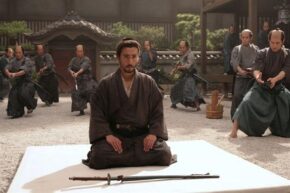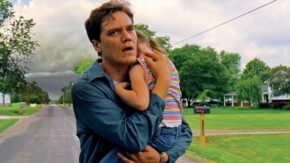CS47
Global Discoveries on DVD: Auteurist and Non-Auteurist Shopping Tips
By Jonathan Rosenbaum | 06/29/2011 | Columns, CS47, From Cinema Scope Magazine
By Jonathan Rosenbaum If there’s any overarching lesson I learned from teaching film history to undergraduates over the past year in Richmond, Virginia (which, logistically speaking, is what obliged me to suspend this column for half a year), it’s that they know both less and more about history and film history than I did as…
Read More → Film/Art | In Das Auge of the Beholder: Thomas Hirschhorn and Bruno Dumont
By Andrea Picard | 06/29/2011 | Columns, CS47, From Cinema Scope Magazine
By Andréa Picard “The intellect may be compared to a carver, but it has the peculiarity of imagining that the chicken always was the separate pieces into which the carving-knife divides it.”—Bertrand Russell In Toronto in early March to put the final touches on his transplanted 2008 Secession sensation Das Auge (The Eye) at the…
Read More → Terri (Azazel Jacobs, US)
By Max Goldberg | 06/28/2011 | CS47, Currency, From Cinema Scope Magazine
By Max Goldberg Azazel Jacobs’s fourth and most polished feature to date grants its eponymous hero (Jacob Wysocki) a surprising foundation of confidence—surprising because he’s a husky adolescent boy who wears pajamas to school. His equanimity is clear from the moment we see him cutting through a dry creek bed with the stride of a…
Read More → Midnight in Paris (Woody Allen, US)
By Adam Nayman | 06/28/2011 | CS47, Currency, From Cinema Scope Magazine
By Adam Nayman Trolling through the dispatches from Cannes, I’ve yet to read one review of Midnight in Paris that invokes La Jetée (1962). This is possibly because in a film that, pace the worst of Woody Allen, takes pains to underline its other references and homages, the nod in Chris Marker’s direction is rather…
Read More → Cannes 2011 | Hara-Kiri: Death of a Samurai (Miike Takashi, Japan) and Guilty of Romance (Sono Sion, Japan)
By Christoph Huber | 06/28/2011 | CS47, Festivals, From Cinema Scope Magazine, Spotlight
By Christoph Huber Programmed in typical Cannes fashion as almost overlapping screenings, the double feature consisting of the press show of Miike Takashi’s competition entry Hara-Kiri: Death of a Samurai and the sole Quinzaine “special screening” of Sono Sion’s Guilty of Romance made for an instructive lesson in festival reception. On the most superficial level,…
Read More → Cannes 2011 | Melancholia (Lars von Trier, Denmark)
By Richard Porton | 06/28/2011 | CS47, Festivals, From Cinema Scope Magazine, Spotlight
By Richard Porton “The purpose of provocations is to get people to think,” declared Lars von Trier in Stig Björkman’s documentary Tranceformer—A Portrait of Lars von Trier (1997). By those standards, the provocation von Trier masterminded at the 2011 Cannes Film Festival, which, in reference to the concomitant Dominique Strauss-Kahn affair that monopolized the television…
Read More → Cannes 2011 | This Is Not a Film Festival
By Mark Peranson | 06/28/2011 | CS47, Festivals, From Cinema Scope Magazine, Spotlight
By Mark Peranson Cannes, France, Planet Melancholia—“We have a saying in Iran,” said Mojtaba Mirtahmasb, referring to the impetus for his not-a-film made with banned director Jafar Panahi, “that when hairdressers get bored they cut each others’ hair. That is what we were doing: filming one another.” My friends, yet again you are about to…
Read More → Between Two Eyes: Four Emergent Avant-Garde Film/Videomakers for the New Decade
By Michael Sicinski | 06/28/2011 | CS47, Features, From Cinema Scope Magazine
By Michael Sicinski One of the difficulties of writing about experimental film and video is that there aren’t as many opportunities as there ought to be to spotlight filmmakers who we might call, for lack of a better term, developing talent. Magazines like this one (of which, sadly, there are few) customarily produce feature articles…
Read More → Let the Readings Fly: Jiang Wen Reaches for the Mainstream
By Shelly Kraicer | 06/28/2011 | CS47, Features, From Cinema Scope Magazine
By Shelly Kraicer If you happen to be a Chinese film producer, China looks like the Promised Land, if not the Wild West—a place that’s available, for the taking, with its doors wide open. (Though if you’re an activist in the marginal non-governmental sphere these days, the picture looks quite different). 2010 box-office numbers continued…
Read More → We Need to Talk About Terry: A Roundtable on The Tree of Life
By Cinema Scope | 06/28/2011 | CS47, Features, From Cinema Scope Magazine
By Mark Peranson, Michael Sicinski, Alan Franey, José Teodoro, Tom Charity, C.W. Winter, Olivier Père, Robert Koehler, Olaf Möller, Adam Nayman, Gabe Klinger, Jason Anderson, and Andrew Tracy A tantalizing rumour, never confirmed, spread around Cannes that Thierry Frémaux instructed his jury that if they did not award Terrence Malick’s The Tree of Life…
Read More → Take Shelter: Jeff Nichols’ Age of Anxiety
By Robert Koehler | 06/28/2011 | CS47, From Cinema Scope Magazine, Interviews
By Robert Koehler Unlike any recent American film, Jeff Nichols’ Cannes Critics Week winner Take Shelter gives expression to an extremely nervous country. The pleasure of good action, suspense, or horror films is that they elicit a physical response, drawing out a reaction and release in the viewer that can even be transformative. The viewer…
Read More → A Marriage Made in Heaven: Stuart Staples on Tindersticks’ Claire Denis Film Scores
By Jason Anderson | 06/28/2011 | CS47, From Cinema Scope Magazine, Interviews
By Jason Anderson “The most beautiful sound next to silence.” That was the appropriately evocative motto for ECM, the vanguard jazz and new classical label much admired by audiophile aesthetes partial to Ärvo Part cantos and Bang & Olufsen components. Yet this phrase applies equally well to the music that Tindersticks have made for six…
Read More → Welcome to Calais: Sylvain George and the Aesthetics of Resistance
By Jay Kuehner | 06/28/2011 | CS47, From Cinema Scope Magazine, Interviews
By Jay Kuehner The judiciously titled Qu’ils reposent en révolte (des figures de guerres) is prefaced by a crepuscular pan of imposing peaks (Mount Sinai) underscored by a cryptic quote regarding divine violence (from Walter Benjamin’s Critique of Violence), followed by a negative-stock image of the Pyramids before then cutting to the manicured familiarity of…
Read More → 














